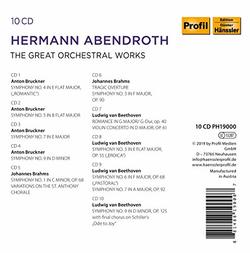| All Artists: David Oistrakh; Rundfunk-Sinfoni-Orchester Leipzig Title: Great Orchestral Works Members Wishing: 0 Total Copies: 0 Label: Profil - G Haenssler Release Date: 10/11/2019 Album Type: Box set Genre: Classical Style: Number of Discs: 10 SwapaCD Credits: 10 UPC: 881488190007 |
Search - David Oistrakh; Rundfunk-Sinfoni-Orchester Leipzig :: Great Orchestral Works
 | David Oistrakh; Rundfunk-Sinfoni-Orchester Leipzig Great Orchestral Works Genre: Classical Hermann Abendroth (18831956) was just three years older than Wilhelm Furtwängler. These two great conductors of the German Romantic orchestral tradition remained in their senior posts during the Third Reich Furtwä... more » |
Larger Image |
CD Details
Synopsis
Product Description
Hermann Abendroth (18831956) was just three years older than Wilhelm Furtwängler. These two great conductors of the German Romantic orchestral tradition remained in their senior posts during the Third Reich Furtwängler in Berlin, Abendroth in Leipzig and suffered the consequences in the early post-war period of not having openly opposed the Nazi regime. After working in Munich, Lübeck and Essen in the early years of his career, Abendroth was from 1915 to 1934 leader of the Gürzenich Orchestra in Cologne and from 1925 director of the city's conservatory and of the Music Festival of the Lower Rhine, becoming director of the Gewandhaus Orchestra in Leipzig in 1934 after Bruno Walter was forced out by the Nazis. Even as late as March 1945 Abendroth was conducting what were presumably the last symphonic works performed there, to be heard on the albums of this collection alongside Bruckner's Seventh recorded in February 1956, just a few months before his death on May 29 of that year. When his work at the Gewandhaus came to an end in 1945 Abendroth initially found a new field of activity with the newly constituted Radio Symphony Orchestra of Leipzig, later assuming a similar position in Berlin, where he was able to pass on to the post-war orchestral generation the experience of his successful conducting career. He had gained the requisite know-how in the early years of his training, since one of his teachers was Felix Mottl, who from 1886 to 1906 was one of the most important conductors in Bayreuth, to whom posterity is indebted for the orchestral arrangement of Wagner's Wesendonck Lieder.
